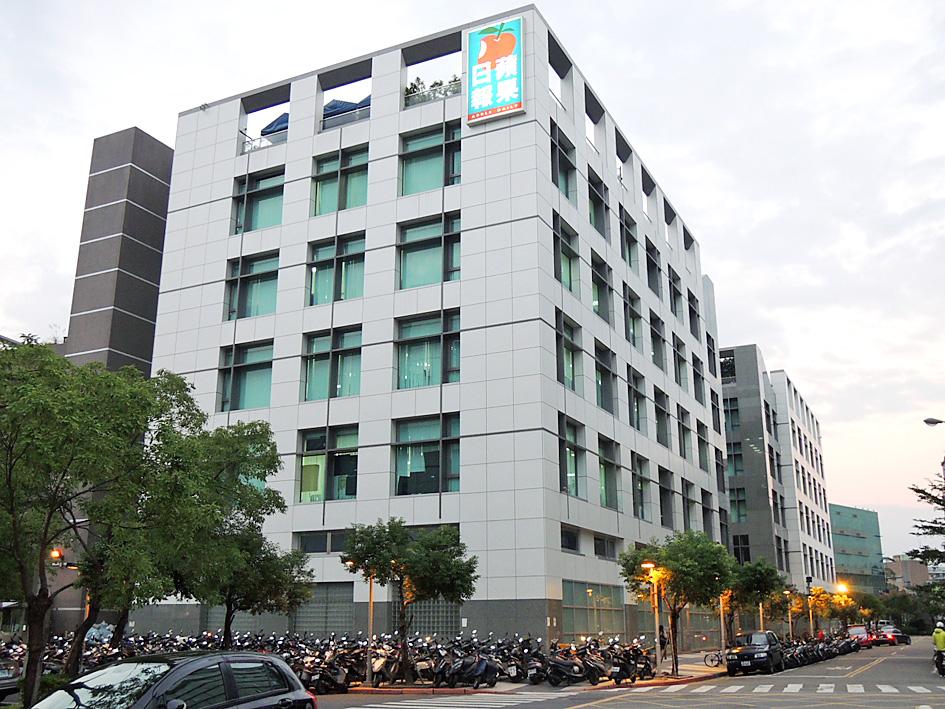Hong Kong’s Next Digital on Tuesday denied media reports that it had sold Taiwan’s Apple Daily news Web site.
The company, which is under liquidation, said in a Hong Kong Stock Exchange filing that it refuted “certain media reports.”
However, its liquidators said the company has disposed of its business in Taiwan for more than NT$300 million (US$10.09 million), adding that they are investigating the reports and would “take necessary action” if any unauthorized disposal of its business has occurred.

Photo: Wu Yueh-hsiu, Taipei Times
Next Digital subsidiary Apple Daily Public Development Ltd “holds the business of Taiwan Apple Daily,” the filing said.
CONTRADICTION
The liquidators contradicted a statement the Apple Daily posted on its Web site on Wednesday last week saying that its sale and transfer to a new owner had been completed.
While the statement did not name the new owner, anonymous sources told Chinese-language media that the buyers are Singaporean entrepreneur Joseph Phua (潘杰賢) and Hong Kong businessman Kenny Wee (黃浩).
The Apple Daily’s prospective takeover has also sparked concerns that the company could be used by Chinese authorities to infiltrate Taiwan’s media landscape, prompting Taipei to vow “strict scrutiny” of any potential sale.
The Hong Kong-based print edition of the Apple Daily was forced to shut down in June last year following the arrest of several newspaper executives and journalists, and the freezing of the company’s assets.
Next Digital in May last year stopped publishing the paper’s Taiwanese print edition, but has continued operating as an online news site.

A preclearance service to facilitate entry for people traveling to select airports in Japan would be available from Thursday next week to Feb. 25 at Taiwan Taoyuan International Airport, Taoyuan International Airport Corp (TIAC) said on Tuesday. The service was first made available to Taiwanese travelers throughout the winter vacation of 2024 and during the Lunar New Year holiday. In addition to flights to the Japanese cities of Hakodate, Asahikawa, Akita, Sendai, Niigata, Okayama, Takamatsu, Kumamoto and Kagoshima, the service would be available to travelers to Kobe and Oita. The service can be accessed by passengers of 15 flight routes operated by

MORE FALL: An investigation into one of Xi’s key cronies, part of a broader ‘anti-corruption’ drive, indicates that he might have a deep distrust in the military, an expert said China’s latest military purge underscores systemic risks in its shift from collective leadership to sole rule under Chinese President Xi Jinping (習近平), and could disrupt its chain of command and military capabilities, a national security official said yesterday. If decisionmaking within the Chinese Communist Party has become “irrational” under one-man rule, the Taiwan Strait and the regional situation must be approached with extreme caution, given unforeseen risks, they added. The anonymous official made the remarks as China’s Central Military Commission Vice Chairman Zhang Youxia (張又俠) and Joint Staff Department Chief of Staff Liu Zhenli (劉振立) were reportedly being investigated for suspected “serious

ENHANCING EFFICIENCY: The apron can accommodate 16 airplanes overnight at Taoyuan airport while work on the third runway continues, the transport minister said A new temporary overnight parking apron at Taiwan Taoyuan International Airport is to start operating on Friday next week to boost operational efficiency while the third runway is being constructed, the Ministry of Transportation and Communications said yesterday. The apron — one of the crucial projects in the construction of the third runway — can accommodate 16 aircraft overnight at the nation’s largest international airport, Minister of Transportation and Communications Chen Shih-kai (陳世凱) told reporters while inspecting the new facility yesterday morning. Aside from providing the airport operator with greater flexibility in aircraft parking during the third runway construction,

Taiwanese and US defense groups are collaborating to introduce deployable, semi-autonomous manufacturing systems for drones and components in a boost to the nation’s supply chain resilience. Taiwan’s G-Tech Optroelectronics Corp subsidiary GTOC and the US’ Aerkomm Inc on Friday announced an agreement with fellow US-based Firestorm Lab to adopt the latter’s xCell, a technology featuring 3D printers fitted in 6.1m container units. The systems enable aerial platforms and parts to be produced in high volumes from dispersed nodes capable of rapid redeployment, to minimize the risk of enemy strikes and to meet field requirements, they said. Firestorm chief technology officer Ian Muceus said